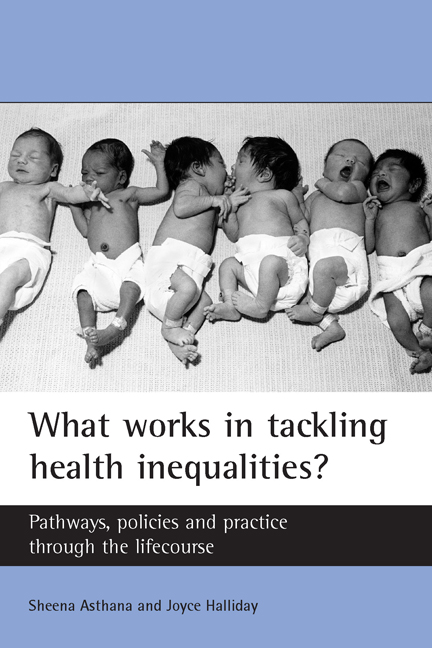Book contents
- Frontmatter
- Dedication
- Contents
- List of tables, boxes and figure
- Acknowledgements
- List of abbreviations
- one Introduction
- Part 1 The research and policy context of health inequalities
- Part 2 Health inequalities pathways, policies and practice through the lifecourse
- Part 3 Tackling health inequalities: developing an evidence base for public health
- Index
twelve - Health inequalities during older age: research evidence
Published online by Cambridge University Press: 14 January 2022
- Frontmatter
- Dedication
- Contents
- List of tables, boxes and figure
- Acknowledgements
- List of abbreviations
- one Introduction
- Part 1 The research and policy context of health inequalities
- Part 2 Health inequalities pathways, policies and practice through the lifecourse
- Part 3 Tackling health inequalities: developing an evidence base for public health
- Index
Summary
Introduction
Due to the overwhelming use of occupational class in health inequalities research, rather less attention has been paid to health differences between socio-demographic than socio-economic groups. In addition to leading to the relative neglect of important characteristics such as ethnicity, the use of occupational status as a basis for classification has had the unfortunate consequence of rendering invisible those who do not participate in paid work by virtue of their older age. Yet, as we discussed in Chapter Three, old age is a period of significant income poverty. Moreover, divisions in wealth are pronounced in older age and the gap between rich and poor pensioners has continued to grow. This growth in socio-economic variation may have important implications for the level of health variation within this age group.
This chapter explores the consequences of poverty and income polarisation for health inequalities in later life. This is in itself no simple task. According to Khaw (1999), inequalities in health in older people have been neglected for a number of reasons. First, as already noted, the use of occupational status means that health inequalities have been easily identified in younger cohorts but not in groups that are past retirement. Yet, as we observe in the first part of this chapter (which examines variations in mortality and morbidity), previous occupation can be captured both in longitudinal studies that follow up subjects before and after retirement, and in surveys that explicitly collect information on last main occupation, and this has been found to have a major effect on the health of older people (Arber, 1996). Studies using alternative indicators of socio-economic status (for example, housing tenure and educational qualifications) also show that health inequalities persist throughout life.
A second factor identified by Khaw (1999) that explains the relative dearth of health variations literature on this age group is the misconception that health inequalities in older people are less amenable to successful intervention. She challenges this assumption, suggesting “there is abundant evidence that modifying life-styles and environment, or treatment of conditions at older ages have a substantial effect on elderly people's health. If anything, many interventions may in fact have greater absolute impact for elderly people” (Khaw, 1999, p 40).
- Type
- Chapter
- Information
- What Works in Tackling Health Inequalities?Pathways, Policies and Practice through the Lifecourse, pp. 475 - 506Publisher: Bristol University PressPrint publication year: 2006

